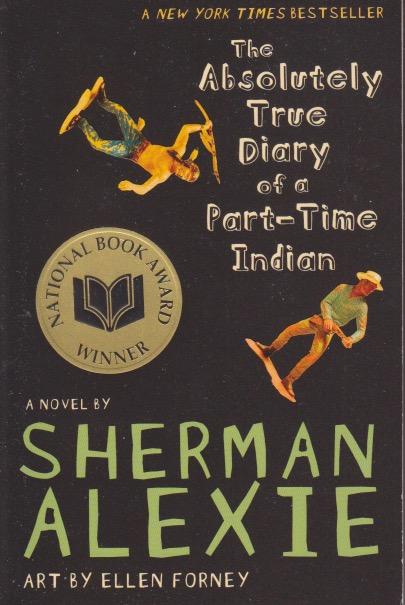
In honor of Banned Book Week I read Sherman Alexie’s The Absolutely True Diary of a Part-Time Indian. Funny and poignant, it tells the story of Arnold Spirit Junior, a Spokane tribe boy on the reservation. Born with a disability, he nevertheless overcomes adversity to become both a good student and excellent basketball player. I suppose you’d classify this as young adult literature since the protagonist is a teen and many of the issues are those of kids in that age group. Although it’s funny, and the illustrations underscore this, there’s a realism that account for various people wishing to ban it. First of all, it reminds readers that white men put Indians on reservations and, despite our national guilt about this, we still refuse to do anything to try to lift them out of poverty. And, like most boys his age, Junior likes to talk about sex once in a while.
Fiction can be the most nonfictional form of writing. Junior describes the realities of reservation life. Alcoholism, poverty, and violence are part of his everyday experience. He attends far more funerals than his white counterparts. This particular point gave me pause. A New York Times article that appeared pointed out, statistically, that American Indians had much higher death rates from Covid than many other demographics. It was like the genocidal introduction of European diseases during the “age of discovery.” I suppose people would’ve grown curious and explored their world, regardless of the distorted Christian belief that they were to take it over. At least we could’ve treated those we met with respect, as equals.
I think about the missionary mandate quite a lot. Based on an undying literalism, it became an excuse for behaviors explicitly condemned by Scripture itself. There’s a real danger when conviction comes with guns. At least modern-day missionaries try to help those they’re attempting to convert with hospitals and medical care. Still, that doesn’t help the American Indians. They still struggle and our policies still ignore their problems. Their plight stands in the way of capitalistic exploitation. And when an Indian writes a fun book, honest about the experience of his people white critics begin to raise their voices to ban it. How do we think the situation of the Indians will ever improve if we refuse to listen? And what better time to get people to listen but when they’re young enough not to have been corrupted by our system of entrenched unfair treatment?
